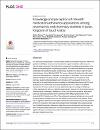Knowledge and perception of mHealth medication adherence applications among pharmacists and pharmacy students in Jazan, Kingdom of Saudi Arabia

عرض / فتح
التاريخ
2024-08-30المؤلف
Rehman, WajihaThanganadar, Hemalatha
Idrees, Sumaira
Mehmood, Asim
Azeez, Fahad Khan
Almaimani, Hanan Abdullah
Rajpoot, Pushp Lata
Mustapha, Mohammed
...show more authors ...show less authors
البيانات الوصفية
عرض كامل للتسجيلةالملخص
The advances in digital health, including mobile healthcare (mHealth) medication adherence applications (MApps), have been demonstrated to support medication adherence and improve health outcomes. This study aims to evaluate the knowledge and perception of the MApps among pharmacists and pharmacy students. An online cross-sectional survey was conducted among 223 pharmacists and pharmacy students in the Jazan region of Saudi Arabia between 1st and 30th April 2023. The survey collected information about the participants’ socio-demographics, knowledge, and perception of the MApps. Among the 223 participants included in the study, 105 (47.1%) were pharmacists and 118 (52.9%) were pharmacy students. Most participants were females (72.6%) and aged 18–30 (70.4%). About half of the participants had poor knowledge of the MApps [pharmacists (48.0%) and students (42.0%)] and mainly encountered Medisafe (18.1%) or Pills (17.0%) MApps, respectively. Pharmacy students showed significantly higher knowledge of MApps (p = 0.048), especially the Pills (p = 0.022) than pharmacists. However, the pharmacists had significantly higher knowledge of MyMeds (p = 0.001) than pharmacy students. Most participants had a positive perception of the usefulness of the MApps (pharmacists, 79.0%; students 80.0%). Notably, over 85% of the participants expressed willingness to know and provide guidance on MApps, with over 50% willing to recommend it to the patients. There was no significant difference in perception between the pharmacists and pharmacy students (p>0.05). In conclusion, the study demonstrates limited knowledge with a positive perception of mHealth medication adherence applications among pharmacists and pharmacy students. Integrating digital adherence tools like the MApps into pharmacy training could significantly improve professional practice mHealth competencies, and optimize healthcare delivery and patient outcomes.
معرّف المصادر الموحد
https://www.scopus.com/inward/record.uri?partnerID=HzOxMe3b&scp=85202966076&origin=inwardالمجموعات
- أبحاث التخصصات الصحية [96 items ]

